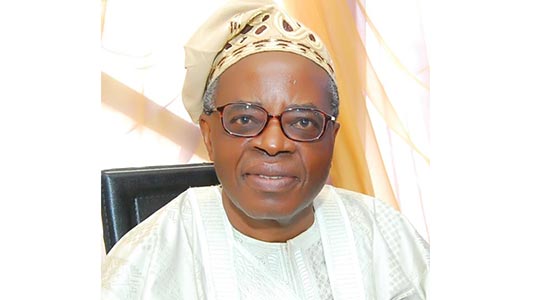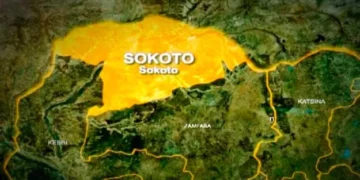Our Deputy Governor Our newly minted Ogbeni-Oja, The Lord Mayor, Metro, Alhaji Bola Owodunni Metros and Metro Queens, Ladies and Gentlemen.
I am truly honored to join you in celebrating the 40th anniversary of the Ijebu-Ode Metropolitan Club. This milestone celebrates the Club’s longevity, rich legacies and achievements that have made the club relevant in society today. As we reflect on the past four decades, let us not only celebrate our achievements but also look ahead to the promising future that awaits the Ijebu-Ode Metropolitan Club and Ijebuland. In other words, let use this opportunity as a call to action for a well-prepared generational succession plan for the Ijebu people, ensuring a lasting legacy for the Ijebu-Ode Metropolitan Club.
Today’s theme, “Generational Succession in Service,” is profoundly relevant not only for the Ijebu-Ode Metropolitan Club, but for our nation, Ogun state, Ijebuland and humanity. Reflecting on the Club’s 40-year journey, the foundation of our success lies not only in the present, but in the seamless transition of service and excellence from one generation to the next. This principle extends beyond the myopic focus on family businesses, but encompasses values, socio-cultural, including educational succession, political succession, corporate succession etc.
In every realm of human life, leaders must eventually pass on their roles and responsibilities to their successors (appointed or otherwise). Most of us here are living examples. Succession, therefore, should not be a sudden or unexpected development that might cripple a system, but a natural and inevitable part of organizational evolution. It is crucial that generational succession planning be backed by thoroughness and intentionality. Some experts propose that an organization’s overall success could be measured by how seamlessly it weathers an executive transition
Generational succession is a dynamic commitment to preserving the values, knowledge, and legacy of those who have gone before us, while also embracing innovation, adaptability, and the aspirations of future generations. At its core, generational succession involves passing on wisdom, experience, and best practices from seasoned veterans to emerging leaders through mentorship, collaboration, and the cultivation of talent. The instrument of generational succession ensures the preservation and transmission of cherished Yoruba values, such as Omoluabi, as articulated by the founding fathers of this great club, despite inter-generational differences in the last four decades.
What is omo-olu-iwa-bi? The Ijebu historical accounts suggest that we had an ancestor called Olu-Iwa. Some would readily suggest that Omoluabi derives from this our hero past. I would suggest that it is good character, inclusive of integrity. Integrity is the highest character: olu-iwa. The capacity to do that which is good and proper even when no-one is looking. I would like to suggest that the Yoruba concept of Omoluabi encompasses another great value emphasized by the Zulu: “Ubuntu”, which encompasses the ideas of interconnectedness and communal harmony.
We need to deliberately heighten conversations and debates that raise questions on the relevance of Omoluabi and Ubuntu to today’s Ijebuland, nay Nigeria and Africa that is throwing away virtues, values and cultures in the pursuit of foreign values and norms being presented as natural for all of mankind .
“Omoluabi” epitomizes a human role model with a strong emphasis on empathy towards others and exemplary character. Omoluabi not only recognizes the community orientation in humanity: I am because you are” that Ubuntu teaches, an Omoluabi lives in a way that recognizes the unity of the present with the ancestral past as well as the future of the yet unborn. An Omoluabi, characterized by integrity and hard work, rejects shortcuts that disregard others in society, avoids disrespecting ancestors‘ memories, and ensures responsible consideration for the welfare of future generations.
Omoluabi stands in stark contrast to the egoistic self foisted on us by the dog-eat-dog competition prevalent in Western orientations. Corruption is anathema to an Omoluabi just as it is to Ubuntu. It is certain that corruption kills and eschews Ubuntu and Omoluabi, since a most crucial value for Omoluabi – integrity – is necessarily absent when corruption reins. With Omoluabi in place, there are limits on pursuing things that would be considered as shameful. “Ti Omoluabi ba wa, itiju a wa”. Corruption is sadistic for it destroys much of the lives of many in society, even if the egoistic conscience-less individual appears to be happy .
The issue is: what generational values are being passed on to the coming generations of Ijebu people? What are our individual efforts within our families? What are the collective efforts in teaching sustainable values? What can Metros do to re-emphasise Omoluabi values?
Today, our emphasis is on money and crass materialism. Making money is all that matters. The wealthy, irrespective of the source of wealth, are rewarded. Chieftaincies are exchanged for money. A very good example was the Ijebu young man who was jailed for five years in the US for wire fraud and aggravated identity theft. Prior to his arrest, being jailed he lived large and was a favorite of Kings as well as Lords Temporal and Spiritual in Nigeria. On completion of five years in jail in the US and with enough money, it would not be surprising that drums are rolled out to receive him by Ijebu people as he dances into religious organizations for blessings. Thereafter, he could still be in contention for several political offices in Nigeria.
It is time we return to the values that emphasized hard work without cutting corners. We constantly recanted “ise ni ogun ise”, those days. If you stole a pencil from school those days, your parents dragged you back to school to ensure restitution to the pupil you stole from. We can all, including Ijebu-Ode Metropolitan Club, turn things around by frowning at young people seeking to cut corners in the search for money. Such sustainable accountability values must start from home as we boldly pressure our larger society to emphasise Omoluabi.
As we celebrate today, we must also recognize the importance of mentorship and knowledge transfer in ensuring a seamless transition from one generation to the next. The wisdom and experience of seasoned professionals serve as invaluable resources for the younger generation. fostering a culture of mentorship that not only imparts expertise but also instill a sense of pride and commitment in those who will carry the torch forward. Additionally, integrating virtues of accountability and anti-corruption into our mentorship and knowledge transfer systems is paramount. Embracing value-based, visionary leadership becomes imperative to save Ijebuland and Nigeria from the current state of socio-economic, political crisis, resulting from poor governance which, as expected, is accompanied by persisting poverty.
In my career, I have been trying to examine what can be done to address the problem of poverty. An exploration of the works of many an expert, and the United Nations efforts point at the need to interlink four pillars: peace/security; development; human rights and fostering humanitarian resilience. My work over the years led me to conclude that these four pillars are not enough. They in turn must be situated within four foundational issues: governance; external dynamics; institutions; and resources. My analysis, I tagged situational quadruple nexus (SQN). I need to avoid turning my Guest address into a lecture room by stating that the most crucial one among the four foundational issues is leadership.
In any organized social structure, individuals or groups in positions of authority, tasked with aggregating, articulating, and ensuring the implementation of a vision for positive collective change, are considered leaders . Leadership extends beyond the political realm and is pervasive in family, social groups, organizations, and nation-states. Leaders, found in various spheres such as politico-economic, administration, academia, religion, etc., inspire positive change for the common good and effectively communicate the reasons for such change. Despite historical emphasis on political leaders, leadership manifests across diverse levels of human interaction.
In my third year in the secondary school, my aspirations shifted from wanting to be like Obafemi Awolowo (Awo), (the Premier of the Western Region of Nigeria), which had been my primary school dream . I witnessed the impactful strides of Awo as it positively touched all lives. Service to the people was not a slogan; it manifested in initiatives like free education, the provision of basic amenities like pipe-borne water, electricity, and communication through rediffusion. I no longer had to accompany my mother to Odo-Owa (a small river on the outskirts of Ijebu-Ode) to fetch water. Though we never had electricity till I left Higher Secondary School, our neighbours had it. I could watch television at the Onabolu family house or at the police barracks, and my cognition grew. Roads were being tarred and programmed to be tarred to last for a very long time. I remember the joy of my father when the road to Odosenlu via Erunwon was tarred up to Ita- Marun. It made it easy to reach Idode, that is up to Osun River whose planned bridge, as the local stories whispered, had been carted away by late Ojajagba, the former Ogbeni-Oja to J-4 where he had great farm interests. The extraordinarily shorter distance to Ondo and the expansion of Ijebuland with the convergence of people transiting Ijebu-Ode to Ibadan and those from Ondo and neighbours in the original design was sacrificed. However, with the Ijebu-Ode to Ita-Marun road done a lot of agricultural produce from ehin Osun could easily reach Ijebu-Ode without getting spoilt. I remember sitting with my mum and products in those “motor Ghana” of the period when we were not walking the five miles to Odosenlu if there were no products to ferry to Ijebu-Ode. Once or twice, we walked the entire ten miles. Having ten miles tarmacked should not a big deal today if corruption is not reducing the availability of funding for such potentially profitable ventures for many small-scale farmers.
We need to ask ourselves, if generational leadership succession has been improving or degrading since the Awo period among the Ijebu within Yorubaland and Nigeria, at large. There was the story of Awo leading the Action Group (A.G.) team to the 1957 Constitutional Conference in London. Pa Alfred Rewane, a member of the team fell ill and incurred a bill of one hundred and sixty pounds sterling. Chief M.E.R. Okorodudu, the Western Region Agent-General in London sought Awo’s approval to take out of the delegate funds to pay for Pa Rewane’s hospital bills. Awo strongly objected. He gave a personal donation of fifty pounds and asked Sam Shonibare and others to contribute. What has been the generational leadership succession experience today?
Today, people in public offices are in search of opportunities to waste/steal public funds through many needless plans that bring too little or no impact. We focus on the federal government without keenly looking at the level of corruption at the state and local government levels. Leadership is no longer service to the people but an opportunity for self-enrichment. Sadly, the generational change is that we now consider lack of accountability as normal. Those who stand up to challenge this norm, advocating for essential infrastructural developments for health and education, often face attacks and are abandoned to rot in jail.
Ladies and gentlemen, as a young boy walking to school, there were many productive entities at Ijebu-Ode. Foremost among these was the efforts of Ogbeni-Oja Adeola Odutola and his industries. He was known in Nigeria and beyond for being an industrialist with his production base in Ijebuland. He grew rubber, palm produce, retreaded tyres, made biscuits, and brewed ‘33’ lager beer. He employed several people and others served as distributors of his products. Alhaja Ayinke Aberuagba was involved in making lace as did Shokas. Alhaja Aberuagba was a major distributor for the major breweries and soft drinks producers. There were a number of soft drinks bottling outfits, including Sunrise Bottling Company promoted by Alhaja Àdùnní SEICO. There were several UAC and other large corporate retail outlets, including Abusi Edumare stores, Aduke stores, Oluseun Chemists and several palm and cocoa produce quality assessment outlets owned by the major rich families of the period. Printing outlets of the period, like Sebiotimo and Olubade Press, met the needs of local authors and publishers like Way to Success – Kola-Sanya Investments Limited which sold several copies of Way to Success and other secondary school textbooks. There were several bakeries like Bojela where I used to buy oven-hot bread on errand for my Dad in those days. Jesu Oyingbo restaurants and barbing salon contributed to the bustling nature of Ijebu-Ode. The lumberjack business thrived and Forest Guards were all over the place as the middle-class gentlemen of the town. Even before Bisrod furniture outlet, there had been furniture making industry at Oke-Owa. I need not emphasise the national and international stature of schools like Ijebu-Ode Grammar School, as well as Ijebu Muslim College, Adeola Odutola College, Anglican Girls Grammar School, Our Lady of Apostles, the Muslim Girls High School, Sanni Luba College.
Our Awujale, Oba Sikiru Adetona equally tried his hands in production. As he noted in his autobiography, some of his business ventures, including Wadai Industries failed. I once listened to a radio programme that recalled the purported Alaafin Aole’s curse on the Yoruba. The Awujale was also said on that programme to have issued a general curse against industrial ventures in Ijebuland because some people burnt down Wadai Industries that made quality leather products. Our King did not mention anything about such a curse in his book, but some friends told me that the revered Awujale had debunked such a tale.
In Ijebuland today, the production efforts of two generations ago have not endured beyond the immediate succeeding generation, mirroring a global pattern where only a few family businesses survive beyond two generations. The Ijebu-Ode Metropolitan Club, in collaboration with the Ogbeni-Oja, could spearhead an inquiry into this phenomenon. While Abeokuta and Shagamu thrive for various reasons, including Shagamu‘s advantage in gas, it is worth exploring possibilities for investments in collaboration with Ogun State. This includes tapping into the gas pipeline passing through Ijebuland and extending the supply. Perhaps, through strategic collaboration and advocacy, clubs like Ijebu-Ode Metropolitan can exert pressure on Ogun State and local governments for infrastructural developments in Ijebuland, enhancing commercial endeavors.
All is not bleak. There are different succeeding replacement efforts with respect to new production and supply efforts. It could be useful to examine how Ijebuland is faring within the international, national, and state level since the independence of Nigeria.
I would like to use this opportunity to highlight the legacy project that Prof. Akin Mabogunje brought to Ijebuland and enthusiastically embraced by the Awujale, whose supervision has seen the growth of the initial seed money of 500,000 naira ($3,334) grow into hundreds of millions of dollars over about 25 years. This legacy project under Oba Sikiru Adetona mobilised the age long but rebranded Ijebu age-grade system (Regberegbe), the Council of Ijebu Obas and the Oloritun governance arrangement to own and support the project having its headquarter offices at the palace. The Ijebu Development Initiative on Poverty Reduction (IDIPR) has been receiving national and international attention. Operating largely out of Eriwe and producing Fish, Pigs and Poultry, its January to December 2023 figures show 810 stakeholders with a total value of outputs yielding 2.7 billion naira. The spill-over effects of such an effort can be imagined in keeping Ijebuland afloat with employment for thousands. In 2010, the Awujale estimated that the project had reached over 5,000 people with a revolving loan arrangement having a 98% recovery rate. I attended the 2018 annual general meeting of the project and listened to several of the beneficiaries offering university scholarships to intelligent Ijebu indigent students as some have sponsored their children for education beyond the shores of Nigeria. More can still be done in upscaling these efforts, especially on packaging the fish production for markets beyond the current horizon.
To ensure ongoing success in the evolving landscape of service and industry, embracing adaptability and innovation is essential. Learning from the past, adapting to present challenges, and innovating for the future distinguish thriving organizations across generations. Proactively embracing change and harnessing the power of innovation is key to staying at the forefront of our endeavors. Deliberately preparing for generational change and succession is crucial to acknowledging the necessity to embrace progress. Effectively managing succession and associated changes is critical for the survival of families, associations, businesses, and more. Empowering new generations to creatively embrace change while preserving the core of original values is paramount for staying relevant.
Ladies and Gentlemen, a very relatable example of the need to take very seriously issues of generational succession especially in our local African setting, is in the area of agriculture and or farming succession. More than two-thirds of the African population are under 30 years old Most of them still live in rural areas despite migration to the cities. Unemployment and Underemployment determine the living conditions in urban as well as rural settings. However, in many African countries, agriculture and key stakeholders in the sector is grossly averaged . Unfortunately, there is not a clear-cut deliberate plan or structure to catch the interest of potential future successors and drivers of the sector through a generational succession plan.
However, there are certain things that can be done to cause a mindset shift and begin to build the consciousness of the need for generational succession especially for us Africans and Nigerians.
We need to re-learn (learn and un-learn) some of our ideas and deeply rooted orientation about how, when, why we transfer authority and responsibilities to others.
Re-thinking how, when and why we train the minds of our children via a catch them younger approach towards growing up into responsible adults that are able to take things over. For instance, when kids begin to do basic things, do we point them to some chores? What do we do, when they grow up to high school or college-age? When do we start talking to them about leadership, corruption, budgeting, financial management, etc.
Conclusion
Succession involves passing treasures from one generation to the next, and building responsible leadership across generations. Despite its challenges, generational succession requires us to confront change, uncertainty, and the evolving demands of our dynamic world. It calls for transcending traditions, and embracing innovation, diversity, and inclusivity as catalysts for progress and renewal. Standing between our past and our future, let us celebrate not only the defining years that have shaped us but also pledge to uphold our legacy, foster mentorship, and embrace transformative changes propelling us to new heights.
As we navigate the path of excellence in service, drawing inspiration from history’s many lessons of resilience, vision, and determination, let us embrace the spirit of collaboration and cooperation, recognizing that our collective strength lies in our ability to unite across generations and diverse perspectives in pursuit of common goals. Crucially, let us empower the next generation of leaders, providing them with the guidance, support, and opportunities they need to thrive and make their mark on the world. Let us foster a culture of continuous learning, innovation, and ethical leadership, instilling in future generations the values of integrity, compassion, and social responsibility that are the hallmarks of true excellence in service.
In closing, as we reflect on the theme of generational succession in service, let us embrace the opportunities and challenges that lie ahead with optimism, courage, and a steadfast determination to leave behind a legacy that will inspire and endure for generations to come.
I am grateful to every member and leaders of the Ijebu-Ode Metropolitan Club—past, present, and future. Thank you, and may you and successive generations to come, continue to write the story of success together. Metros need to join others in finding realistic and practical ways of re-emphasising the values of Omoluabi.
Thank you.
Babafemi A. Badejo, author of a best-seller on politics in Kenya, was a former Deputy Special Representative of the UN Secretary- General for Somalia, and currently a Legal Practitioner and Professor of Political Science/International Relations, Chrisland University, Abeokuta. Nigeria.





